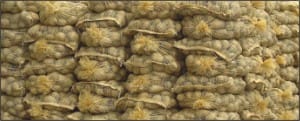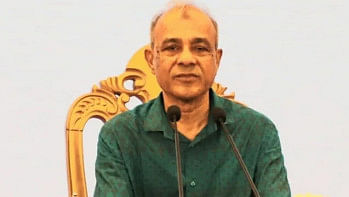Potato for everyone?

A file photo shows potatoes stockpiled last week at Mahiganj in Rangpur to be exported.Photo: STAR
In the face of domestic and worldwide shortage of food production, food prices in Bangladesh have risen rapidly and beyond the affordability of the commons. Rice price increase is what has affected them the most, since it has posed a high threat to the food security of the people, particularly the poor. Wheat has long served as the substitute of rice for the people in Bangladesh but in the background of recent price rise of both rice and wheat at the same time, one might be tempted to look for other substitutes for rice, especially for the poor people whose real income is under serious pressure due to the price hike.
Recently a few professionals, both domestic and international, have proposed substitution of potato for rice, to maintain food security and to decrease the pressure on rice consumption and thus its price. Potatoes have traditionally been considered as a vegetable and rice as a cereal. But with rich starch and other nutritional contents, comparatively lower price and cooked in different forms potato may indeed serve as a substitute for rice. At this point, it is worth looking at the actual dynamics between these two agricultural commodities that exist in our country, to know whether poor people actually substitute potato for rice when rice price rises.
This can be done by looking at three different sets of household data compiled between 1997 and 2000. Considering all the households of each data set and arriving at the analysis results, it is interesting to see that rice and potato are found to be complementary goods in the first set of 1997-98 data but becomes supplementary in the next two periods. There is also more evidence of substitution among poor and rural households.
As we can see, potatoes were initially treated as a complementary commodity to rice, as is also supported by historical practices among researchers in the subject. But with time it seems to have been established as a substitute good, especially to the poor and in rural areas, possibly due to rising rice prices. But if this is so, it calls for a new dimension to policy making as far as providing food security to the poor is concerned.
Historically (1971-2006) rice has dominated the production of foodgrains (rice, wheat, maize) with a massive average share of 94% and potato has dominated production of vegetables with an average share of about 66% (Agricultural Statistics). The prices of potato and coarse rice (widely consumed by poor people) are usually seen to move together on the whole but the fluctuation is more for potato. This is expected as rice price is dominated by world rice price which generally shows little seasonal variation. In contrast, potato consumption is mostly met out of domestic production and so its price is expected to fluctuate over different seasons and may at times pose problems for the poor.
Therefore, if we decide to extend this practice of substitution of potato for rice (although what it means is to ask people, especially the poor, to go against our traditional food habit and thus possibly making them worse off), the government has to ensure stable price of potato at the least. Potato production of this season has been huge, with enough potential to exert a downward pressure on potato price. But this low price may not sustain for long. Once the stock of potato produced in this season is depleted and potato consumption goes up (to substitute rice), prices of potato is very likely to go up too. To add to it, in the coming rainy season and the following flood periods, production of other vegetables may get washed away and potato prices can very well follow the path of the rice price, in which case we may have to look for another substitute yet again.
[email protected]

 For all latest news, follow The Daily Star's Google News channel.
For all latest news, follow The Daily Star's Google News channel. 



Comments